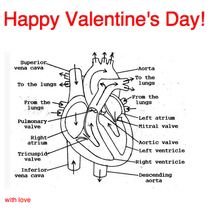
February is National Heart month. It is also the month when we think of romantic love. Is there a connection?
When I was in my twenties, I received a Valentine with an illustration of a heart, not just a heart, the human heart, ventricles, aorta, vena cava and all.
The person who made this unique Valentine for me was a medical student, on whom I had a tremendous crush. I didn’t know back then, that his February 14th greeting had a not only a positive effect on my romantic soul, but also on my physical well-being. Being in love is good for us.
In 2004 book Why We Love: The Nature and Chemistry of Romantic Love, anthropologist Helen Fisher relates that much of romance is hard-wired. Behavioral research tells us that crucial chemicals are released when we fall in love. Two, nor epinephrine and dopamine, create dramatic surges in energy, passion and joy. We suddenly feel invincible, powerful and even feel less pain.
The long-term attachment felt after the initial, passionate phase of our relationship ends is related to Oxytocin and our Nerve Growth Factor which is high in people who are in love, keeps our hearts beating a bit more regularly.
Being in love, the state of deeper devotion has its upsides for our health as well. Dr. Dean Ornish, M.D. in his book, Love and Survival, the Scientific Basis for the Healing Power of Intimacy reports on a study at Yale that involved 119 men and 40 women undergoing coronary angiography, a test that looks at the circulation in the heart. Those who felt the most loved and supported had substantially fewer blockages in their arteries.
In a related study, researchers looked at almost 10 thousand married men with no prior history of angina, chest pain that signifies that the heart is not getting enough blood supply. These men had high levels of risk factors, such as elevated cholesterol, high blood pressure, diabetes, and electrocardiogram abnormalities. Those who felt their wives showed them love experienced half as many episodes of angina.
All love that assists our health is not romantic. We can feel love for someone who is not a romantic partner; in fact, we more often feel love without being "in love." We frequently extend the more general kind of love to relatives, friends and pets, and that benefit our heart's health.
Love is good for the aging process. The results of a study of more than 700 elderly adults showed that the effects of aging were influenced more by what the participants contributed to their social support network than what they received from it. In other words, the more love and support they gave, the more they benefited.
Dr. Ornish found that social intimacy, friends, family, coworkers, and our community, might even protect us from infectious diseases, like the common cold. In a study of 276 healthy volunteers ranging in age from 18 to 55, all participants received nasal drops containing rhinovirus, which causes the common cold. Researchers assessed subjects on 12 types of relationships, including relationship with spouse, parents, parents-in-law, children and other close family members, neighbors, friends, co-workers schoolmates, and member of various groups. They scored a point for each type of relationship if they spoke to a person in that category at least once every two weeks. While almost all of the people exposed to the cold virus were infected, not everyone developed the signs and symptoms of a cold. The participants who reported only one to three types of relationships had more than four times the risk of developing a cold than those reporting six or more types of relationships.
Whether we have a significant other, a lovely social support system or a cuddly pet, the chemical effects of love improve our health. Being “in love” and being loved and supported in a wider context sets forth a complex series of events within our bodies that generally bring about better health.
"When you feel loved, nurtured, cared for, supported, and intimate, you are much more likely to be happier and healthier.” Dr Ornish says. “You have a much lower risk of getting sick and, if you do, a much greater chance of surviving,"
Another factor that helps you to survive is to know the symptoms of a Heart Attack and get medical help quickly.
Men and women differ in how they experience this life-threatening event.
Heart Attack Symptom in MEN:
· Discomfort in the chest that can feel like pressure, fullness, squeezing or pain. It may last for few minutes or come and go.
· Shortness of breath, lightheadedness, nausea, or sweating
· Abdominal discomfort that may feel like indigestion
All men should be familiar with these heart attack symptoms:
Heart Attack Symptoms in WOMEN prior to their heart attack and the incidence:
· Unusual fatigue - 70%
· Sleep disturbance - 48%
· Shortness of breath - 42%
· Indigestion - 39%
· Anxiety - 35%
Major symptoms during the heart attack include:
· Shortness of breath - 58%
· Weakness - 55%
· Unusual fatigue - 43%
· Cold sweat - 39%
· Dizziness - 39%
http://www.goredforwomen.org/index.aspx
 RSS Feed
RSS Feed
